Impossible n'est pas français.
“Impossible n’est pas français”
When I was told that I would not be working in the busy and populated surrounds of Grenoble, but instead in a small and seemingly unknown village in the north of France called Épône, “impossible” was definitely a word that sprang to mind when thinking of being able to do a good YARP; as in my head I had managed to convince myself that the only place I would be able to do my project would be in this area. Furthermore, having prepared to spend my year abroad surrounded by a large hub of people in the South, you can imaging my worry when I was told that I would in fact be working for the Académie de Versailles – in the complete opposite end of the country – in a small town that when googled, had this as its main image…
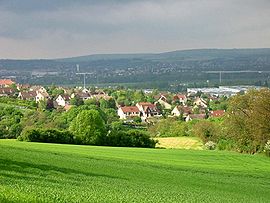
However, since mid-September (I arrived September 15th), I have had time to explore this great commune and the Collège Benjamin Franklin where I work, and have found in fact that my title rings true, in that where I thought that my YARP project would be impossible to carry out here is not the case, and that the translation of “There is no such word as can’t” has in fact become true.
The second meaning of my title, “Impossible nest pas français“, is my attempt at a witty play on word “impossible” – which is not just part of a great French saying but also demonstrates the introduction of English words into everyday French, and is therefore a nod towards my YARP project which looks at the increased use of English in France, or more specifically in the town where I live.
Even though I am still in the early days of my research here, I have already managed to find many examples of the use of English in 3 main, different areas of Épône.
1) Bienvenue chez la famille Bacca
Since mid-September, I have had the good fortune to live with a fantastic family in Épône in a beautiful 4 story house 5 minutes from the Collège I work at…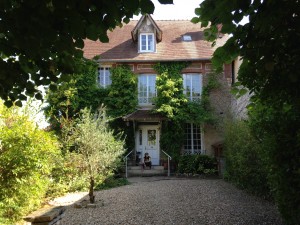 Once again, it was not something that I had originally planned on doing, but fortunately for me, it means that I have the chance to practice my French every day and try some amazing, authentic French cuisine, as thankfully my landlady is a fabulous cook. I also live with her 2 children who are 14 and 18 years old which is great for me, as I have found myself picking up both more “grown-up” phrases from my landlady, and more “youthful”/ “cool” phrases from the younger members of the family.
Once again, it was not something that I had originally planned on doing, but fortunately for me, it means that I have the chance to practice my French every day and try some amazing, authentic French cuisine, as thankfully my landlady is a fabulous cook. I also live with her 2 children who are 14 and 18 years old which is great for me, as I have found myself picking up both more “grown-up” phrases from my landlady, and more “youthful”/ “cool” phrases from the younger members of the family.
I also live with another important member of the Collège Benjamin Franklin as shown below (with his permission)…

This is a great opportunity for me, as it not only gives me someone to share my new and wonderful experiences in Paris with, but also I have the chance to practice my “Columbian” Spanish daily, to make sure that I am ready for stage 6 on my return! 🙂
Although, I haven’t conducted any formal interviews yet with the family members, I have been doing a lot of observing and keeping a field diary of when, where, who etc uses English around the house. Interestingly, I have found that a fair amount of English words can be heard chez-moi, especially concerning songs. For example, one day after school, the youngest member of the family came home with some school mates (about 14 years old), and decided to give a couple of very loud but very good renditions of the songs “Happy” by Pharrell Williams, and “I’m singing in the rain” – originally made famous I believe by Gene Kelley; not realising that I was stood outside the kitchen. I was pleasantly surprised by the fact that the girls knew most of the words in English by heart, and managed to sing these songs with a pretty good English accent.
I also spoke to the youngest member of the family about what type of music she liked, and who her favourite singer was, and was rather shocked to hear not a list of Francophone singers, but instead a list of names such as Adele, Rihanna, Taylor Swift and many other English-speaking singers. She then showed me a book that her mother got her for her birthday called “Chart Hits of 2012-2013“, which she uses on a regular basis weekly, and which solely include English songs – not a word of French at all.
I also met my landlady’s young nephew, who is about 8 years old. One day he decided to show me some videos on youtube, and it was interesting to see that the videos he’d been looking at had mostly been motorcycle sports videos with English titles and English-speaking people. Although he said that he did not really understand what was being said often, it will be interesting to talk to him more (when I have permission of course) about the use of English in the YouTube videos, and to see what he has to say about it throughout the year. Will it help him acquire English easier? Will he use any words he hears from the videos? Will it make him want to learn English so he can understand the videos more?
2) At the Collège
Once again, although I have not been able to do any proper interviews yet (until I get my research protocol forms and whatever else checked and signed), I have been able to make field notes about what I’ve seen/ heard so far around the Collège I work in.
I have once again been shocked at the amount of English in and around the Collège. For example, the number of students sporting a T-shirt or other garments of clothing with English writing or phrases has been astounding. I have seen not only clothing with English scrawled upon it, but also multiple pencil cases and school bags.
Unfortunately I have not got any photographs of this, but I hope in the future to be able to do this once I know whether or not it is acceptable or not, and what type of permission I may need to get in order to do this.
Furthermore, as I am working in a Collège, I realise it will be difficult to conduct certain types of interviews because of the age of the students (between 11-14 years old). Therefore, I have spoken to the Principal of the Collège about setting up a sort of English cafe, where I will be able to talk to students informally about whatever they wish. I am hoping to find out about their experiences with English in terms of how much exposure they have to it outside of the classroom, and about what their opinions are on English i.e. Is it used a lot? Too much? Not a lot? Do they feel that they want to learn it to understand things in the media more? etc As the Principal appeared to like the idea of me setting up this cafe a few times a week, the next step will be to talk to him about my project and hopefully have him sign a form allowing me to use what I learn from these interviews as part of my field notes (all anonymity of the students will be respected of course).
3) In town
After the school day ends (at around 17h normally), I usually enjoy having a slow and leisurly walk around this small but picturesque town on the outskirts of Paris, and have managed to find evidence of lots of English in some of the most unexpected places of the town. Here I enclose a few photos of my finds:
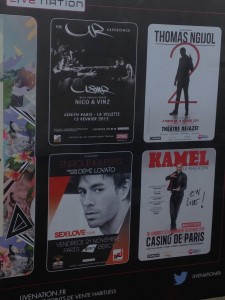
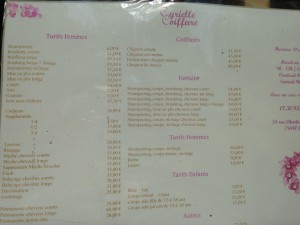
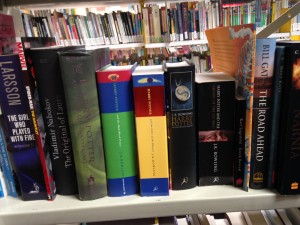




Et voilà, my second complete post from France.


Leave a Reply